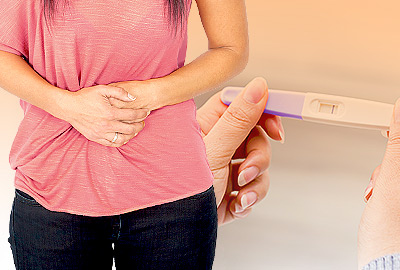Periods are something that, for the majority of a woman's reproductive life, will occur in approximate 28-day cycles, with bleeding lasting between three and five days. However, as a woman enters her forties or fifties, she may start to experience menstrual irregularities. This may be due to the perimenopausal hormonal changes that take place in the body as it prepares for menopause. After years of predictable menstruation, it can be difficult to know how to handle irregular periods, particularly because periods around menopause often include heavier and more painful bleeding than what was previously typical for a woman.
Natural Ways to Treat Irregular Periods
Finding ways to boost estrogen levels is often the most effective method of regulating periods. Estrogen and progesterone are the hormones that control the menstrual cycle, and adjusting your diet to increase your internal estrogenic activity can help restore more regular periods during perimenopause.
Consuming more soy products - such as soymilk and tofu - as well as nuts and seeds can help regulate your periods, as these foods contain phytoestrogens, which are plant compounds that act like estrogen in the human body. Many women find that drinking teas made of estrogenic herbs - such as black cohosh, dong quai, and chasteberry - helps to fix irregular periods and relieve other menopausal symptoms.
Pain Relief for Painful Periods
Irregular periods during menopause are often heavier than those experienced during reproductive years. This is due to a thickening of the uterus wall lining caused by drops in hormone levels. Heavy bleeding when periods occur can come with painful cramping as the uterus contracts to shed its lining.
Exercise is a natural antidote to menstrual cramps; simply walking briskly or jogging outside for 15 minutes can help relieve period pain. Taking over-the-counter painkillers can also help to relieve menstrual cramps.
Dealing with the Emotional Effects of Irregular Periods
When it comes to dealing with irregular periods, learning how to use relaxation techniques - such as yoga, reading, laughing with friends, deep breathing, or meditation -will help prevent stress and heavy periods. Practical solutions can also reduce emotional stress; carry plenty of sanitary wear in your bag so that you can feel confident you will not get your period or have a heavier flow when you have no protection.
Irregular periods are often the first menopause symptom, and women can feel mixed emotions as they enter menopause. Talking with other women who've experienced menopause or with women who are in a similar life phase as you can help you better understand what you will be experiencing. Menopause should be seen as a new adventure rather than a negative experience.
Irregular periods can be a real pain - literally – and are one of the most common menopause symptoms. When you haven't had a period for over a year, menopause has taken place; but, until then, perimenopausal menstrual irregularities can last for up to ten years, so it makes sense to learn ways of manage the symptom to prevent them from impacting your lifestyle. Understanding how to treat irregular periods can help you to better understand your body, give you peace of mind, and help you figure out if any underlying conditions are causing your menstrual irregularities.
Sources
- Chevallier, A. (2000). Encyclopedia of Herbal Medicine. London: Dorling Kindersley Adult.
- Grzanna, R. , Lindmark, L. & Frondoza, C.G. (2005). Ginger-an herbal medicinal product with broad anti-inflammatory actions. Journal of medicinal food, 8(2), 125-132. Retrieved from http://www.ncbi.nlm.nih.gov/pubmed/16117603
- National Health Service UK. (2013). Periods, Irregular - Causes. Retrieved April 11, 2014, from http://www.nhs.uk/Conditions/Periods-irregular/Pages/Causes.aspx
- National Health Service UK. (2013). Periods, Irregular - Treatment. Retrieved April 11, 2014, from http://www.nhs.uk/Conditions/Periods-irregular/Pages/Treatment.aspx
- National Health Service UK. (2013). Pre-menstrual syndrome (PMS). Retrieved April 11, 2014, from http://www.nhs.uk/conditions/premenstrual-syndrome/Pages/Introduction.aspx
- National Institutes of Health. (2014). Menstruation. Retrieved April 11, 2014, from http://www.nlm.nih.gov/medlineplus/menstruation.html
- National Institutes of Health. (2011). Vaginal bleeding: MedlinePlus Medical Encyclopedia. Retrieved April 11, 2014, from http://www.nlm.nih.gov/medlineplus/ency/article/007496.htm
- The Ohio State University. (n.d.). Perimenopause. Retrieved April 11, 2014, from http://medicalcenter.osu.edu/patientcare/healthcare_services/womens_health/menopause/perimenopause/Pages/index.aspx




